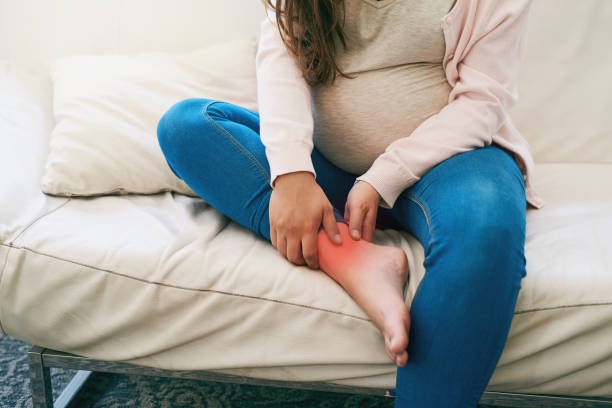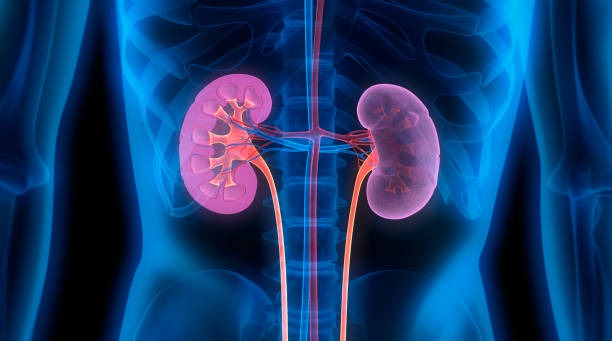Here’s What Causes Swollen Feet, How to Relieve Them and Preventive Measures To It
[ad_1]

According to WebMD – There are various causes of swollen feet. Some are mild, but they can also be a sign of a serious illness. Common in pregnant women, swollen legs can also indicate liver and heart problems. When the legs are swollen, usually not only one leg is affected. This condition can affect both legs as well as spread to the back of the legs and ankles.
Various causes of swollen feet
There are various causes of swollen feet that you need to know about, ranging from mild to severe conditions.
1. Injury
Injury is one of the most common causes of swollen feet. Swelling, usually occurs when there is a broken bone or torn tissue.
When an injury occurs, the blood in the body rushes to the area to help with tissue repair. As a result, blood pools in the area and causes swelling.
2. Edema
Edema occurs when the body stores too much fluid. This causes swelling to appear on the feet, hands, and face.
Edema generally occurs when you are in a sitting or standing position for too long. This condition is not dangerous. But in certain cases, oedema can also be a sign of protein deficiency in the body, kidney failure, or liver disease.
3. Unhealthy lifestyle

Living an unhealthy lifestyle, such as not being active enough, being overweight, consuming too much salt, and wearing shoes that don’t fit your feet properly, can cause swollen feet, which you need to pay attention to.
4. Drug side effects
One type of side effect that can occur from taking certain medications is the accumulation of fluid, especially in the lower body, such as the legs, which eventually causes the legs to become swollen. Drugs that have such side effects include:
Hormones such as oestrogen and testosterone
Steroids
Antidepressants
Diabetes medications
High blood pressure medications, such as calcium channel blockers.
5. Pregnancy

Swollen feet in pregnant women is a common occurrence. This is because during pregnancy, the body stores more fluid. This condition is not dangerous, for mother or baby, but it certainly still causes discomfort.
6. Preeclampsia
If swollen legs in pregnant women are also accompanied by dizziness, nausea, shortness of breath, and abdominal pain, then beware of pre-eclampsia.
Preeclampsia will only appear when the womb reaches 20 weeks of age. This condition arises due to the high blood pressure of pregnant women. Preeclampsia is a serious complication of pregnancy and should be treated by a doctor immediately.
7. Infection

Swollen feet can also be triggered by infection. Diabetics are at greater risk of infection in the foot area, so they need to be more vigilant if there are signs of infection, such as sores and ulcers that appear on the feet.
8. Blood clots
Clotted blood can block blood vessels, so that blood flow to and from the heart is disrupted. One of the effects of this condition is swelling in the legs.
9. Heart disease

Heart diseases such as heart failure can cause swollen legs. This disease makes the heart unable to pump blood properly. As a result, the blood in the legs that should return to the heart cannot be pumped properly.
If your legs are swollen at night, this could be a sign of right-sided heart failure. This condition can cause a build-up of salt and fluid in the body, including the legs.
10. Liver disease
When the liver is not working properly, excess fluid can accumulate in the legs, causing swelling. Liver disorders can occur due to gentile factors, alcohol consumption, viral infections and obesity.
11. Kidney disease

Kidney problems cause salt to build up in the blood. This can cause the body to retain water and subsequently cause swelling in the legs.
12. Alcohol habit
Alcohol can interfere with the absorption of water in the body, so fluid will accumulate in the tissues, causing swollen legs.
If your feet are often swollen after drinking alcohol, then there may be an underlying illness, such as liver, kidney or heart problems.
13. Hot weather

In hot weather, swollen feet can occur, as the blood vessels in the body will dilate to lower body temperature.
This process can lead to fluid leakage into the surrounding tissues, including the feet, causing swelling.
How to treat swollen feet
How to treat swollen feet may vary depending on the cause. Swollen feet caused by mild conditions can usually resolve on their own or with simple home care. While swollen feet caused by severe health problems will require medical treatment.
There are several things you can do to speed up the healing of swollen feet and improve the comfort of your feet, such as:
1. Wear compression socks

Compression socks can apply gentle pressure to the feet and help promote better blood circulation. This can help prevent fluid build-up in the feet and ankles, minimising swelling and pain.
Compression socks come in different sizes and weights. If you are trying for the first time, start with the lightest and measure between 12 to 15 mm or 15 to 20 mm.
You can experiment until you find the type that is most comfortable for you. Make sure you don’t choose something too tight and wear it in the morning for as long as you feel comfortable.
2. Raise your legs above your heart
Raising your legs above the level of your heart can help drain the fluid that has accumulated in your swollen legs. Gravity will help the circulatory system to circulate better to the upper area of the body when the legs are raised.
It is best to avoid standing for long periods of time. It is also advisable to occasionally elevate your legs and support them using a pillow, book, bench, or lean against a wall.
Do this several times a day, for 20 minutes each. This can also help reduce swollen feet during pregnancy.
3. Drink plenty of water

If the body is dehydrated, it retains fluid in the body. This can cause swelling. Therefore, maintaining the body’s fluid intake is also one of the effective ways to deal with swollen feet.
According to the Institute of Medicine of the National Academies, to keep the body well hydrated, it is recommended to consume 2.7 litres of water per day for women and 3.7 litres of water for men. Eighty per cent of the total fluid intake comes from beverages and 20% comes from food.
However, in certain cases such as heart failure or kidney failure, you need to limit your daily fluid intake.
To fulfil this, try to drink 8 to 10 glasses of water per day and eat foods with lots of fluids such as soup, watermelon, melon, and so on.
4. Soak in Epsom salt solution
Soaking in salt water, also known as transdermal magnesium supplementation, can provide benefits to relieve swollen feet. Epsom salt solution (magnesium sulphate) can not only help with muscle pain, but also reduce swelling and inflammation.
It is thought that Epsom salt may help flush out toxins and promote muscle relaxation. Although there has not been much research on the benefits of soaking in Epsom salt solution, there have been many satisfied anecdotal testimonials claiming success.
It is an easy, inexpensive and low-risk method. You can soak in the bathtub, or just the feet for 15 to 20 minutes to experience the benefits.
5. Be active

Sitting or standing in one area for too long can lead to swollen feet. Therefore, you are advised to be more active, for example by giving pauses when sitting for too long by standing or walking for a few minutes.
Try to move every hour even if it’s just a little bit. Moving your knees and ankles can also go a long way in preventing and treating swollen feet due to fluid build-up.
6. Massage the feet gently
Gently massaging the feet is great for promoting relaxation and relieving swollen feet. Massage towards the heart with firm strokes and slight pressure. This will be able to help the fluid that accumulates in the leg area drain so that the swelling can be reduced.
7. Lose weight if overweight
Being overweight or obese can lead to reduced blood circulation. This can lead to swelling in the foot area.
In addition, the extra pressure on the feet also causes them to hurt when walking and causes you to sit more. This in turn can also lead to fluid build-up in the feet.
Losing weight can help reduce the strain on the legs and may help reduce leg swelling.
8. Reduce salt intake
Reducing sodium intake can help reduce swelling in the body, including the legs. Buy foods with low sodium content and try not to add too much salt to food. Limit your salt intake to no more than 1 teaspoon per day.
9. Increase potassium intake
Some of the effects of potassium deficiency are increased blood pressure and water retention, which can lead to swollen feet. Therefore, increasing your intake of potassium-rich foods can help prevent this.
Potassium-rich food sources include bananas, salmon, chicken and sweet potatoes. But you should consult your doctor before adding more potassium to your diet, especially if you have certain health conditions such as kidney problems.
10. Magnesium consumption

Magnesium deficiency can also lead to water retention which makes the feet swollen. Consuming 200 to 400 milligrams of magnesium daily can help with swelling.
Food sources of magnesium include tofu, spinach, broccoli, avocado, almonds, cashews, and dark chocolate.
Apart from food, additional magnesium can also be obtained from supplements. However, consult your doctor before taking magnesium supplements, especially if you have heart and kidney problems.
How to prevent swollen feet:
To prevent swollen feet, follow the steps below.
Exercise regularly, to improve fluid circulation in the body.
Eat nutritious food and reduce salt consumption;
If you have to stand or sit for long periods of time, alternate with moving occasionally.
If you are overweight, work on ways to get to your ideal weight;
Consult your doctor about the medications prescribed to you, ask if there are any medications that can cause fluid build-up;
Avoid smoking, drinking excessive alcohol, and other habits that can trigger swelling in the legs.
Exploring the causes of swollen feet is useful in getting the right treatment. Although generally harmless, you should not underestimate this condition. Seek treatment immediately, before the condition worsens.
Content created and supplied by: Trendyhealth (via Opera
News )
Opera News is a free to use platform and the views and opinions expressed herein are solely those of the author and do not represent, reflect or express the views of Opera News. Any/all written content and images displayed are provided by the blogger/author, appear herein as submitted by the blogger/author and are unedited by Opera News. Opera News does not consent to nor does it condone the posting of any content that violates the rights (including the copyrights) of any third party, nor content that may malign, inter alia, any religion, ethnic group, organization, gender, company, or individual. Opera News furthermore does not condone the use of our platform for the purposes encouraging/endorsing hate speech, violation of human rights and/or utterances of a defamatory nature. If the content contained herein violates any of your rights, including those of copyright, and/or violates any the above mentioned factors, you are requested to immediately notify us using via the following email address operanews-external(at)opera.com and/or report the article using the available reporting functionality built into our Platform
See More
[ad_2]

